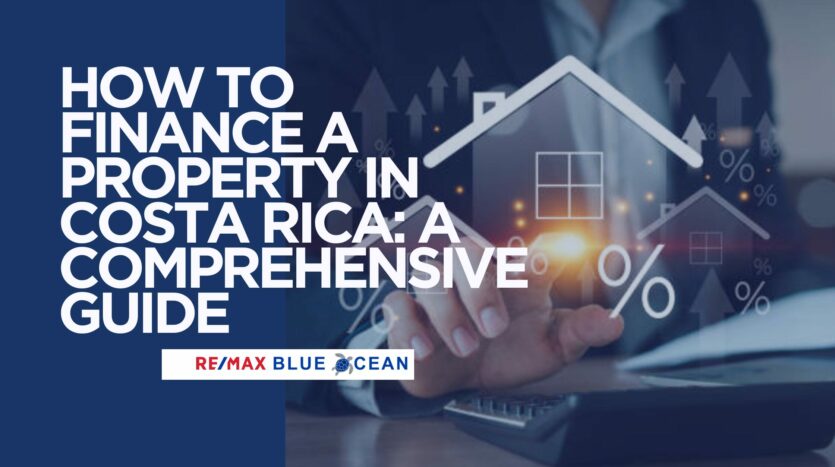How to Finance a Property in Costa Rica: A Comprehensive Guide
Financing a property in Costa Rica can be an exciting opportunity, especially with the country’s booming real estate market. However, navigating the options to finance property in Costa Rica can seem daunting for both locals and expats. In this guide, we’ll break down the essential steps and options available for prospective buyers to help you make informed decisions and streamline the purchasing process.
Understanding Your Financing Options in Costa Rica
Whether you’re planning to invest in a vacation home, rental property, or retirement residence, understanding how to finance property in Costa Rica is crucial. Several financing options are available, but the key is finding one that aligns with your financial goals and circumstances.
1. Local Bank Mortgages
For both Costa Ricans and foreigners, local banks are the most straightforward option to finance property in Costa Rica. These institutions typically offer loans with terms ranging from 15 to 30 years. However, be prepared for stricter requirements than you might find in other countries. Costa Rican banks often require:
- A higher down payment, typically 25-40% of the property’s value.
- Proof of stable income or assets, which may include tax returns, bank statements, or proof of employment.
- A higher interest rate compared to U.S. or European markets.
The documentation process may also take longer, so it’s crucial to start this process early if you’re considering a local bank mortgage.
2. Financing from International Lenders
Another option for expats is to explore financing from international lenders or banks that operate in Costa Rica. These institutions are more familiar with foreign buyers and may offer better interest rates or more flexible terms. U.S.-based lenders, for example, may provide loans for those who have assets or income in the United States, allowing for easier financing.
3. Developer or Seller Financing
In some cases, developers or private sellers offer financing as a way to close the deal faster. This is particularly common in new developments or when sellers are motivated to complete a sale. Seller financing allows buyers to negotiate terms directly with the seller, which can be beneficial if you are looking for a more flexible payment schedule or a lower down payment. Keep in mind that these loans often come with higher interest rates and shorter terms.
The Financing Process in Costa Rica
Once you’ve decided how to finance property in Costa Rica, the next step is navigating the purchase process. While the process may differ slightly depending on the lender and the type of property, the general steps include:
1. Getting Pre-Approved
Before you begin house-hunting, it’s essential to get pre-approved for a mortgage. This shows sellers that you’re a serious buyer and helps you understand how much you can afford. To get pre-approved, you’ll need to provide various financial documents to your lender, including proof of income, tax returns, and asset statements.
2. Conducting Due Diligence
In Costa Rica, it’s essential to work with a qualified real estate attorney to ensure the property title is clear and free of any liens or encumbrances. This due diligence step protects you from legal issues that could arise later in the buying process.
3. Closing the Deal
Once your financing is approved and due diligence is complete, the final step is closing. The closing process in Costa Rica is typically straightforward, though it can take a bit longer than in other countries. At closing, you’ll sign the necessary documents, transfer the down payment, and take ownership of your new property.
Important Considerations for Foreign Buyers
Foreign buyers looking to finance property in Costa Rica should keep a few things in mind:
- Currency Exchange: Most local mortgages are issued in Costa Rican colones. However, some banks offer loans in U.S. dollars. Be aware of exchange rate fluctuations if you choose to finance in colones.
- Legal Assistance: Hiring a real estate attorney familiar with local laws and regulations is essential, especially for foreign buyers unfamiliar with the process.
- Property Taxes and Fees: Be prepared for additional costs, such as property taxes, which are relatively low in Costa Rica, but other fees like notary fees, legal fees, and transfer taxes can add up.
Finding the Right Financing Option
With the proper preparation and understanding, financing property in Costa Rica can be a smooth and rewarding process. Whether you choose a local bank, an international lender, or opt for seller financing, knowing your options will help you secure the property of your dreams.
If you’re looking to finance property in Costa Rica, don’t hesitate to contact RE/MAX Blue Ocean for expert guidance. Our team can help you navigate the financing process and find the perfect property to suit your needs. Explore our property listings today, and let’s get started on your journey to owning a piece of paradise.

